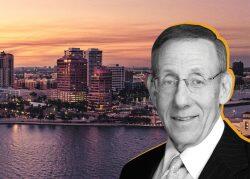Steve Ross mentioned it almost in passing.
After more than 40 years together, his Related Companies and Jorge Pérez’s Related Group had recently “just kind of split,” he said during an industry talk in Miami last week. Ross didn’t state his partner’s name, but he was referring to Related Group.
The separation, which Ross and Pérez said was “very amicable,” prompts questions about how the firms will compete with each other and how Related Group will differentiate itself from Ross’ firm, which is building a team in Miami.
Related Companies, with more than $60 billion in assets owned or under development, and Related Group, with over 90 projects in the pipeline and a portfolio valued at more than $40 billion, could still do deals together, Pérez said via a spokesperson.
Today, “neither company or individuals own any interests on the other,” Pérez said via his spokesperson.
Related Companies declined to comment.
“You almost have to wonder if this isn’t some planned-out strategy,” said Peter Zalewski, a condo market consultant. “I can’t imagine how both Relateds can operate in the same market without some confusion.”
Gentlemen’s agreement
Ross, a former tax attorney who started Related Companies in 1972, partnered with Pérez, then a former urban planner in the city of Miami, to launch Related Group in Miami in 1979 with a deal that the companies would stay out of each other’s territories. Some say it was a gentleman’s agreement, while others describe it as a written contract outlining boundaries in South Florida and other states. Regardless, it sunsetted this year.
Related Companies would stay away from Miami-Dade County — with the exception of Ross’ Miami Dolphins — and Related Group would avoid Palm Beach County, as well as Related Companies’ home base of New York. The companies did collaborate on some South Florida projects, including Related Companies’ W condo-hotel in Fort Lauderdale, and Related Group’s Brickell Heights, a pair of condo towers in Miami where Related Companies bought the commercial space.
Though Ross’ stake in Related Group was diluted over time, the two developers remained close. Pérez said in 2013 that they still spoke daily, in the early mornings and just before bed.
“We grew up together in the business,” Pérez said during a keynote address with Ross nearly a decade ago at the University of Miami. Both got their starts in affordable housing, and both rose to the top of their respective heaps; Pérez is worth $1.7 billion, according to Forbes, which pegs Ross’s net worth at $11.6 billion.
Blurred lines
Ross has described their business philosophies and the markets in which each operated as “totally different.” Related Companies has a greater focus on commercial development, with megadevelopments such as Hudson Yards and Time Warner Center in New York, while Related Group is the “condo king,” the largest developer of for-sale product in Miami, though it also still builds affordable housing and mixed-use projects, and has an office building in the works in Miami Beach.
With Ross living and primarily operating in New York and Pérez doing the same in Miami, there was little overlap until the pandemic.
Ross, who graduated from Miami Beach Senior High School in 1958, fled New York City in 2020 to his oceanfront estate in Palm Beach. Related Companies was already active in West Palm Beach with the 72-acre CityPlace property, but over the last two years it has become the city’s largest office landlord with a handful of towers in the works.
Living in South Florida and seeing the influx of capital, companies and well-heeled people to the region prompted Ross to head farther south. His Hard Rock Stadium in Miami Gardens, home to the Dolphins, now hosts Formula One and the Miami Open and will host part of the FIFA World Cup in 2026.
Read more


Related Companies is building a Miami team, separate from those based in its West Palm Beach office. The firm is hiring analysts and acquisitions talent in Miami, according to sources and postings on LinkedIn, and looking to open an office there.
This year, Related Companies and Swire Properties revealed plans for their 1,000-foot-plus office tower at Brickell City Centre, which will have the largest floor plates in Miami.
Ana Bozovic, founder of real estate data firm Analytics Miami, said that Ross wouldn’t have moved forward with the Brickell office tower prior to the pandemic because demand for new office was not at the level it is today.
“There’s not enough office space [in Miami],” Bozovic said. “He [Ross] has been very vocal about this.”
At last week’s ULI event, Ross said that office activity – he didn’t specify what kind – in Miami would soon outpace West Palm Beach.
Over the summer, Ross also entered into a deal to buy the site of the Deauville Beach Resort, an iconic Miami Beach hotel that was recently demolished by the seller, to turn it into a two-tower oceanfront condo and hotel development designed by Frank Gehry. He pumped nearly $2 million into the political action committee backing a referendum that would have allowed him to develop a larger project on the site.
Though that deal, rumored to be in contract for about $500 million, was contingent on voters approving the ballot question, which they did not, Ross is said to still be pursuing the site for a lower price.
Group lessons
Meanwhile, Related Group entered into a deal last year to co-develop a long-stalled mixed-use project in West Palm Beach called Transit Village. Related is leading the partnership, which includes Isaac Toledano’s BH Group, Israeli billionaire Teddy Sagi, and the project’s original developer, Michael Massanoff. It’s one of three projects Related is pursuing with Sagi and BH Group in South Florida.
The separation of the two Relateds comes at a time when Related Group is undergoing a changing of the guard. Two of Pérez’s children, Jon Paul and Nick, were promoted over the last two years and set up to succeed Pérez: the elder, Jon Paul became president, and Nick became senior vice president. Around the same time, Carlos Rosso, a longtime Related Group executive and head of the firm’s condo development division, left to start his own company.
Both Pérez’s sons apprenticed with Ross in New York before returning to their father’s firm.
“We are freaks when it comes to great, great detail,” Jorge Pérez said in 2013.
Zalewski, the condo consultant, said Ross could capitalize on the Related Group brand in Miami, which could force a name change for Related Group. He compared the brand confusion to Fortune International Group, led by Edgardo Defortuna, and the separate but related Fortune International Realty, led by Walter Defortuna.
Ross “seems to be the one in control from a marketing perspective,” Zalewski said.
“If they’re not working together, the next question becomes why?” Zalewski added. “And how do you make it clear to the marketplace this is two separate companies?”
But Pérez dismissed that, saying both firms will keep their existing names.